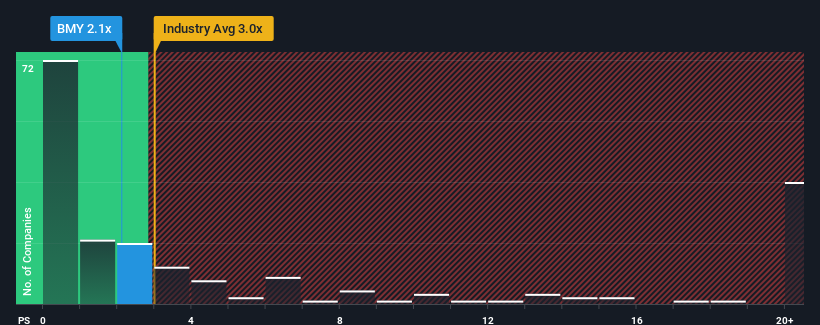- United States
- /
- Pharma
- /
- NYSE:BMY
Bristol-Myers Squibb Company's (NYSE:BMY) Share Price Is Matching Sentiment Around Its Revenues

With a price-to-sales (or "P/S") ratio of 2.1x Bristol-Myers Squibb Company (NYSE:BMY) may be sending bullish signals at the moment, given that almost half of all the Pharmaceuticals companies in the United States have P/S ratios greater than 3x and even P/S higher than 12x are not unusual. Nonetheless, we'd need to dig a little deeper to determine if there is a rational basis for the reduced P/S.
View our latest analysis for Bristol-Myers Squibb

What Does Bristol-Myers Squibb's Recent Performance Look Like?
Recent times haven't been great for Bristol-Myers Squibb as its revenue has been rising slower than most other companies. It seems that many are expecting the uninspiring revenue performance to persist, which has repressed the growth of the P/S ratio. If you still like the company, you'd be hoping revenue doesn't get any worse and that you could pick up some stock while it's out of favour.
If you'd like to see what analysts are forecasting going forward, you should check out our free report on Bristol-Myers Squibb.What Are Revenue Growth Metrics Telling Us About The Low P/S?
There's an inherent assumption that a company should underperform the industry for P/S ratios like Bristol-Myers Squibb's to be considered reasonable.
Retrospectively, the last year delivered a decent 2.9% gain to the company's revenues. Although, the latest three year period in total hasn't been as good as it didn't manage to provide any growth at all. So it appears to us that the company has had a mixed result in terms of growing revenue over that time.
Shifting to the future, estimates from the analysts covering the company suggest revenue growth is heading into negative territory, declining 1.6% per annum over the next three years. That's not great when the rest of the industry is expected to grow by 18% per year.
With this information, we are not surprised that Bristol-Myers Squibb is trading at a P/S lower than the industry. However, shrinking revenues are unlikely to lead to a stable P/S over the longer term. There's potential for the P/S to fall to even lower levels if the company doesn't improve its top-line growth.
The Key Takeaway
Generally, our preference is to limit the use of the price-to-sales ratio to establishing what the market thinks about the overall health of a company.
With revenue forecasts that are inferior to the rest of the industry, it's no surprise that Bristol-Myers Squibb's P/S is on the lower end of the spectrum. As other companies in the industry are forecasting revenue growth, Bristol-Myers Squibb's poor outlook justifies its low P/S ratio. It's hard to see the share price rising strongly in the near future under these circumstances.
Plus, you should also learn about these 2 warning signs we've spotted with Bristol-Myers Squibb.
Of course, profitable companies with a history of great earnings growth are generally safer bets. So you may wish to see this free collection of other companies that have reasonable P/E ratios and have grown earnings strongly.
Valuation is complex, but we're here to simplify it.
Discover if Bristol-Myers Squibb might be undervalued or overvalued with our detailed analysis, featuring fair value estimates, potential risks, dividends, insider trades, and its financial condition.
Access Free AnalysisHave feedback on this article? Concerned about the content? Get in touch with us directly. Alternatively, email editorial-team (at) simplywallst.com.
This article by Simply Wall St is general in nature. We provide commentary based on historical data and analyst forecasts only using an unbiased methodology and our articles are not intended to be financial advice. It does not constitute a recommendation to buy or sell any stock, and does not take account of your objectives, or your financial situation. We aim to bring you long-term focused analysis driven by fundamental data. Note that our analysis may not factor in the latest price-sensitive company announcements or qualitative material. Simply Wall St has no position in any stocks mentioned.
About NYSE:BMY
Bristol-Myers Squibb
Bristol-Myers Squibb Company discovers, develops, licenses, manufactures, markets, distributes, and sells biopharmaceutical products worldwide.
Undervalued established dividend payer.
Similar Companies
Market Insights
Community Narratives


